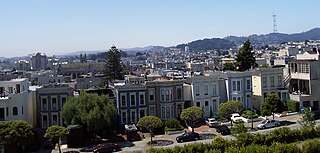
Alviso is a district of San Jose, California, located in North San Jose on the southern shores of San Francisco Bay. Originally an independent town, founded in 1852, today Alviso is San Jose's only waterfront district, primarily residential in nature, with several Silicon Valley tech companies and recreation-oriented businesses. Alviso is named after 19th-century Californio ranchero Ignacio Alviso, who owned the area as part of his Rancho Rincón de Los Esteros.

Japantown, also known as J-Town or historically as Japanese Town, is a neighborhood in the Western Addition district of San Francisco, California. Japantown comprises about six city blocks and is considered one of the largest and oldest ethnic enclaves in the United States.

Westbeth Artists Housing is a nonprofit housing and commercial complex dedicated to providing affordable living and working space for artists and arts organizations in New York City. The complex comprises the full city block bounded by West, Bethune, Washington and Bank Streets in the West Village neighborhood of Manhattan, New York City; the complex is named for the streets West and Bethune.

The California School for the Blind is a public educational institution for blind children, K-12, located in Fremont, California. Its campus is located next to the California School for the Deaf.
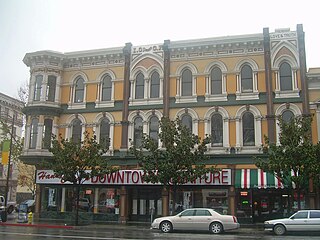
The Downtown Historic District of San Jose, California is a designated U.S. Historic District area of the city roughly the size of one square block. It is bounded by S. First Street to the west, E. San Fernando Street to the south, S. Third Street to the east, and E. Santa Clara Street to the north, but also includes the south side of E. Santa Clara Street between Third and Fourth Streets.
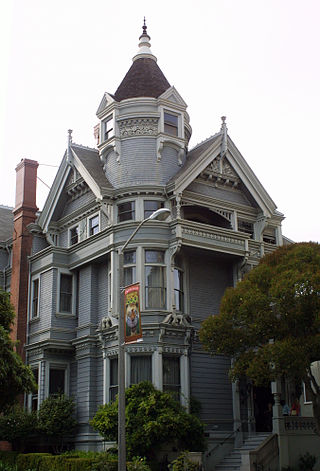
The Haas–Lilienthal House is a historic building located at 2007 Franklin Street in San Francisco, California, United States, within the Pacific Heights neighborhood. Built in 1886 for William and Bertha Haas, it survived the 1906 San Francisco earthquake and subsequent fire. The Victorian era house is a San Francisco Designated Landmark and is listed on the U.S. National Register of Historic Places. It was converted into museum with period furniture and artifacts, which as of 2016 received over 6,500 visitors annually.

The William Westerfeld House, also known as the "Russian Embassy", is a historic building located at 1198 Fulton Street in San Francisco, California, United States, across the street from the northwest corner of Alamo Square. Constructed for German-born confectioner William Westerfeld in 1889, the home is listed on the National Register of Historic Places and is San Francisco Landmark Number 135.
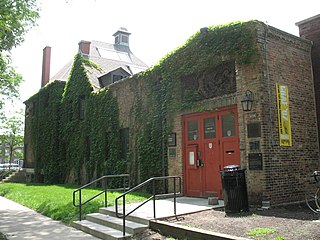
The Lorado Taft Midway Studios are a historic artist studio complex at South Ingleside Avenue and East 60th Street, on the campus of the University of Chicago on the South Side of Chicago. The architecturally haphazard structure, originating as two converted barns and a Victorian house, was used from 1906 to 1929 as the studio of Lorado Taft (1860-1936), one of the most influential sculptors of the period. A National Historic Landmark, it now houses the university's visual arts department.

The Samuel J. Tilden House is a historic townhouse pair at 14-15 Gramercy Park South in Manhattan, New York City. Built in 1845, it was the home of Samuel J. Tilden (1814–1886), former governor of New York, a fierce opponent of the Tweed Ring and Tammany Hall, and the losing presidential candidate in the disputed 1876 election. Tilden lived in the brownstone from 1860 until his death in 1886. From 1881 to 1884, Calvert Vaux combined it with the row house next door, also built in 1845, to make the building that now stands, which has been described as "the height of Victorian Gothic in residential architecture" with Italian Renaissance style elements. Since 1906 it has been the headquarters of the National Arts Club, a private arts club.

The McElroy Octagon House, also known as the Colonial Dames Octagon House, is a historic octagonal house now located at 2645 Gough Street at Union Street in the Cow Hollow neighborhood of San Francisco, California, United States.
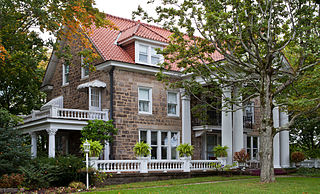
Welsh–Emery House is a historic building in Richeyville, Pennsylvania.

St. Joseph's Church and Complex is a historic church built in 1906, and located at 1401–1415 Howard Street in the South of Market neighborhood of San Francisco, California, United States.
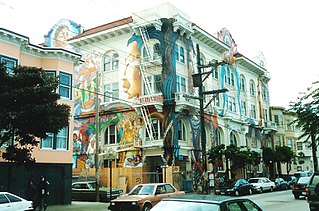
The Women's Building is a women-led non-profit arts and education community center located in San Francisco, California, which advocates self-determination, gender equality and social justice. The four-story building rents to multiple tenants and serves over 20,000 women a year. The building has served as an event and meeting space since 1979, when it was purchased by the San Francisco Women's Center. The building is shielded from rising real estate costs in the Mission District because that group has owned the building since 1995.

The Baker and Hamilton Building, also known as Pacific Hardware and Steel Company Building and Baker, Hamilton and Pacific Company, is a historic office building and former commercial building built in 1905, and located in South of Market at 601 Townsend Street in San Francisco, California.

The Frank G. Edwards House is a historic residential building built in 1883, and located at 1366 Guerrero Street in the Noe Valley section of San Francisco, California.

The Old San Francisco Mint is a building that served as the location of the San Francisco branch of the United States Mint from 1874 until 1937. The building is one of the few that survived the great 1906 San Francisco earthquake and resulting fire. It was designated a National Historic Landmark in 1961, and as a California Historical Landmark in 1974.

The Colombo Building, also known as the Drexler Building or Drexler-Colombo Building, is a historic commercial building built in 1913, and is located at 1–21 Columbus Avenue in the Jackson Square Historic District in San Francisco, California.

The Mish House, also known as the Sarah Mish House, is a historic house built in 1885 and located in 1153 Oak Street in the Haight-Ashbury neighborhood of San Francisco, California.





